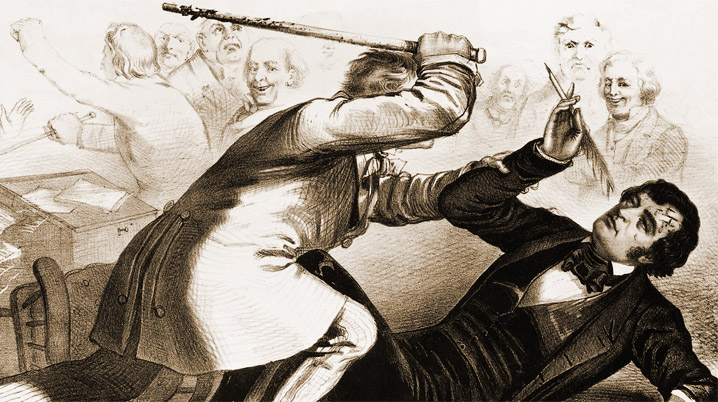The party of Preston Brooks

Cancel culture is real, as anyone who tries to discuss the felonies committed by convicted felon Donald Trump on the floor of the United States House of Representatives will find out:
The history-making felony conviction of former President Donald J. Trump has raised some historic questions for the House’s rules of decorum, which have existed for centuries but can be bent to the will of whichever party controls the majority-driven chamber.
The Republicans who now hold the majority have used those rules to impose what is essentially a gag order against talking about Mr. Trump’s hush-money payments to a porn actress or about the fact that he is a felon at all, notwithstanding that those assertions are no longer merely allegations but the basis of a jury’s guilty verdict. Doing so, they have declared, is a violation of House rules.
In short, perhaps the only place in the United States where people are barred from talking freely about Mr. Trump’s crimes is the floor of what is often referred to as “the people’s House,” where Republicans have gone so far as to erase one such mention from the official record.
In recent weeks, Republican leaders have cracked down on Democrats who refer to Mr. Trump’s court cases on the floor, citing the centuries-old rules of decorum, which date back to the days of Thomas Jefferson. Merely mentioning that Mr. Trump is a felon prompts an admonishment from whomever is presiding when the offending fact is uttered. (Mr. Trump is also indicted on felony charges in cases related to his handling of classified documents and attempting to overturn the 2020 election.)
“The chair would remind members to refrain from engaging in personalities toward presumptive nominees for the office of the president,” is now a common phrase heard in the chamber after the mention of the words “Trump” and “felon.”
On one occasion, Republicans barred Representative Jim McGovern, Democrat of Massachusetts, from speaking for the rest of the day and deleted his comments from the Congressional Record after he railed against Mr. Trump and his court cases.
“When they censor any mention of Donald Trump’s criminal convictions, they are essentially trying to ban a fact,” Representative Jamie Raskin of Maryland, the top Democrat on the Oversight Committee, said in an interview. “I am not aware of any precedent where factual statements have been banned in our lifetime.”Mr. Raskin said the silencing of Mr. Trump’s critics on the House floor had a historical analog: the House’s pre-Civil War ban on legislation relating to the abolition of slavery. In 1836, the House passed a so-called gag rule that automatically postponed action on all petitions related to slavery without hearing them.
Mr. Raskin said the silencing of Mr. Trump’s critics on the House floor had a historical analog: the House’s pre-Civil War ban on legislation relating to the abolition of slavery. In 1836, the House passed a so-called gag rule that automatically postponed action on all petitions related to slavery without hearing them.
One of the few things as uncivil as accurately describing a Republicans stated policy positions is describing the crimes for which a Republican has been convicted by a jury of his peers after a fair trial.


